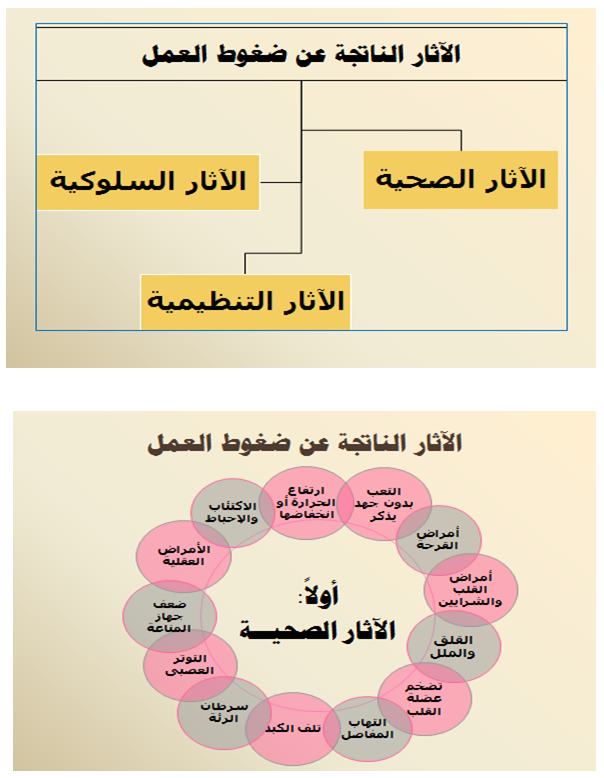
Chapter Four
- Work pressure
It is a process of conflict that spoils the individual's happiness and mental and physical health. It occurs when an individual demands performance beyond his normal capabilities.
The concept of work stress :
• It 's called work stress Job Stress In general, these are the variables that surround workers and cause them to feel stressed .
• The danger of this feeling lies in its negative consequences, which are represented in various cases, including :
• Work pressure is everything that has a material or moral impact and takes forms that influence the behavior of the decision maker .
**Symptoms resulting from work stress .
- Negative effects and results related to the organization .
1. Absence from work - being late - or even stopping work.
2. Job turnover, i.e. job instability for a long period.
3. Complaints by employees and customers .
4. Lack of attention to scheduling machines in the case of factories.
5. Work accidents increased .
6. Low degree of a person’s love for his work and satisfaction with it.
7. Hesitation in decision making that affects production efficiency.
8. Low morale.
9. Low job motivation among employees.
10. Feeling dissatisfied with work.
11. Poor communication and human relations.
12. Error in making decisions.
13. Negatively affecting the quality of work relationships .
**Sources of work stress :
1. Sources related to the work itself.
2. Sources related to the employee himself .
3. Family-related resources.
4. Lifestyle reasons.
Sources that relate to the work itself.
o The seriousness of decisions
o The need for continuous concentration and exchange of information with others .
o Carrying out atypical duties .
o Promotion to a job with requirements higher than human ability
o Requirements and non-routine work .
o Dealing with different organizations .
o Having relationships with complex environments .
o Increased workload.
o Performance evaluation .
o No job guarantees .
o Feeling weak job security .


Strategies for dealing with work pressures :
Pressures are a feature of the modern era, and are the result of the interactions of complex civil elements that cannot be ignored or completely avoided in any way, but they can be managed by controlling them by improving individuals’ abilities to adapt, developing appropriate administrative values in them, and controlling the factors influencing the general climate. The institution can confront it before it occurs or benefit from it and direct it in the right direction. It is possible for a person to face many pressures in his life and deal with them effectively and limit their negative effects on him .
The most prominent strategies for dealing with work stress include the following:
1- Returning to religion: for spiritual and emotional support, contentment and tranquility, and overcoming stressful situations by increasing the amount of worship and continuous supplication to God Almighty, which gives the soul calm and tranquility .
2- Medical examination, exercise, and hobbies: Continuous exposure to work stress has negative effects on health, and therefore periodic medical examination is the beginning of procedures for eliminating work stress or alleviating it by treating its health consequences by taking appropriate medical measures .
3- Changing the pattern of behavior through training: It is a strategy that seeks to modify the individual’s behavior in response to sources of work stress through practice to achieve the desired change, which addresses, for example, the following:
a- Rest and relaxation: by obtaining appropriate rest periods during work time, in addition to official leave away from the work atmosphere and its pressures .
b- Waiting and restraining anger: trying to force oneself not to get emotional, to wait for the right time, and not to rush.
c- Acceptance and surrender: which is accepting reality, living with it as it is, and acknowledging it .
4- Social support: It is represented by the search for social support by the individual, either to obtain information that helps understand the problem that causes pressure to find ways to solve it, or for emotional support that helps him withstand the wave of emotion by establishing close friendship relationships with individuals with whom he feels comfortable and trusts their balance and health. Their judgment on matters.
5 - Alternative job opportunities: This strategy is used after the failure of all previous attempts when the individual believes that the work pressures on him have exceeded the limit and are bringing him closer to a point of danger. Therefore, leaving work and looking for another alternative job opportunity to change the whole situation is the solution.
- In the event of a conflict with others or a difference of opinion, do not make it your goal to win everything.
- Opening areas for negotiation, exchanging views, and reaching compromise solutions.
- Distribute the burdens placed on your shoulders as much as possible.
- Slow down and slow down your speed and rhythm of work and movement.
- Training and career development.
- Re-arrange your goals when there are things that are difficult to achieve.
- Do not overestimate different situations and problems and their consequences.
- Reducing negative assumptions (what if it happens...).
- Increased ability to bear hardships and problems.
- Do not over-generalize matters (driving a car, not helping).
- Stop jumping to conclusions (not receiving an invitation from a friend,...)
- Avoid expectations that are not based on realistic foundations.
- Time Management :
Determine a time to complete the required tasks, and prepare a daily and weekly plan.
- Communicate with others .
- Record stressful situations and how to deal with them.
- Forgiveness and tolerance of those who wronged you.
Its influence on decisions :
- Individuals may lose their ability to make effective decisions, especially when their self-confidence begins to collapse, and this affects the health of the individual, his family, and his work alike.
- The decisions an individual makes may be flawed decisions, and thus they lead to more disputes, accidents, financial losses, and the person may even lose his job .
Causes of work stress:
• Overlapping or unclear job descriptions
• Poor communication
• Inappropriate working conditions
• Lack of ventilation
• Inefficient lighting
• Isolation inside the building.
All of these are things that can contribute to high rates of illness and absenteeism.
Types of pressures:
First: internal or psychological
Such as ambitions and striving to reach the top, when competition becomes intense and the individual is exposed to pressure, striving to excel over others at work.
Second: external
Environmental requirements, family pressure on the father to earn more, social pressures (customs and traditions and society’s discontent when they are not followed), work pressures.
